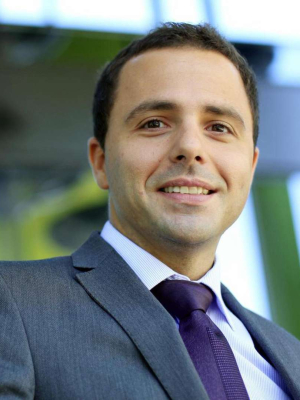Build your skills for a global future
The International Relations major is designed for students who wish to deepen their knowledge and understanding of this multi-disciplinary field. Students receive a solid foundation for a variety of careers in areas such as diplomatic and government service, international organizations, international business, journalism, law and banking. Many graduates have also chosen to pursue graduate study in related areas.
Majors
In the International Relations major, students take core courses in political science, economics, and history and undertake interdisciplinary work in areas such as languages, cultural studies, or communications. The major aims to provide students with the instruments and techniques to analyze complex phenomena in the era of globalization.
The IR major provides a solid foundation for a variety of careers and graduate study in areas such as diplomatic service, international organizations, international business, journalism, law, and banking.
International Relations
The major in International Relations is designed for students who wish to deepen their knowledge and understanding of this multi-disciplinary field. Students receive a solid foundation for a variety of careers in areas such as diplomatic and government service, international organizations, international business, journalism, law and banking. Many graduates have also chosen to pursue graduate study in related areas.
In this major students take core courses in political science, sociology, and history and undertake interdisciplinary work in areas such as languages, cultural studies, economics or communications. The major aims to provide students with the instruments and techniques to analyze complex phenomena in the era of globalization.
Not open to majors in Political Science or Political Science with an emphasis in Global Political Economy.
Major Requirements (51 Credits)
- Foundation Courses (15 credits)
-
- POL 100 Introduction to Political Science
-
Basic concepts of the discipline are discussed in this class with a focus on the evolution of the state and the role of the individual from historical, ideological, and comparative perspectives.
- POL 101 Introduction to International Relations
-
This course provides the basic analytic tools necessary for the understanding of international relations. After a brief introduction to the realist and liberal approaches to the study of international relations, the course covers various fundamental concepts, such as national power, foreign policy, conflict, political economy, international trade, and international organizations.
- POL 112 Markets, Policy and Administration
-
The analysis of contemporary challenges calls for a theoretically informed and multi-disciplinary approach. This course introduces students to the key concepts related to allocating tangible and intangible resources under conditions of scarcity, and producing public or commercial goods and services. In doing so, the course draws on political, managerial, game-theoretical and economic frameworks and encourages students to apply them to a broad range of cases. The objectives include enabling students to understand and analyze policy-making, the functioning of markets and their social and political implications, as well as the management of public and private institutions. Specific topics covered include (but are not limited to) modes of decision-making, rational behavior, supply and demand, competitive dynamics, welfare, externalities and public goods, consumer choice, and basic monetary and fiscal policy. While special emphasis will be placed on the analysis of political and managerial challenges, the course is relevant to students of other disciplines.
- SOC 100 Introduction to Sociology
-
What is ''society''? What does its structure look like and how does it work? How does it change? Why does it change? How do are individuals and society intertwined? This course provides students with the tools to answer these questions. Modern societies have experienced dramatic social changes with the emergence of individualism, new class structures, the development of urban life or changing relationships between individuals and their natural environments. Sociology provides an understanding of these changes by studying human interactions and forms of social organization. In this course, students will be introduced to major sociological thinkers, concepts and approaches.
- And
- HIS 101 Western Civilization II: Modern
-
This survey course is an introduction to the political, economic, social, and intellectual history of the west from the scientific revolution to the present. Our knowledge and understanding of the past is contingent and contested. The course explores areas of contestation to give students a better understanding of the forces and events which have shaped the modern world.
- Or
- HIS 105 Global History II: Globalization, the Emergence of the Modern State, and Coping with Change
-
This course is an introduction to themes and trends in the political, economic, cultural, and social history of modern societies in global perspective. It covers the development of societies in Eurasia, Africa, and the Americas from the ''Columbian Exchange'' to the twenty-first century with emphasis on the development of institutions within their changing cultural, political, and environmental context, as well as the impact of encounters between human societies. Students are introduced to the historiography of globalization and of the modern state. Further attention is devoted to the analysis of different categories of primary sources. (It is recommended that HIS 104 be taken prior to HIS 105).
- Required Courses (12 credits)
-
- POL 300 Comparative Politics
-
The development of the modern nation-state is analyzed from a variety of theoretical viewpoints. The approach and methods of major social theorists are examined in detail. Formerly POL 400. Students who have previously earned credit for POL 400 cannot earn credit for POL 300.
- POL 301 Theories of International Relations
-
This course concentrates on the major approaches, models and theories in the study of international relations. Micro and macro theories, deductive and inductive methods are explored from historical, political and economic perspectives. The relations between the major powers in the twentieth century are examined for their relevance in the study of international politics.
- POL 321 International Organization
-
The focus of this course is the development of supra-national and international agencies and entities. The United Nations, the European Union, the IMF, the World Bank, trading blocs, and other specialized agencies are studied as examples-in light of increasing economic interdependence in the international system.
- POL 377 International Political Economy
-
The interplay between political and economic issues has become central to the study of international relations in the modern world. This course will examine the traditional theoretical foundations of International Political Economy (the views of the liberals, the Marxists, the nationalists, etc.) and their applicability to today's world. Using an inter-disciplinary approach, the course will look at both historical background and present-day issues and conditions. The problems of development and North-South relations and the question of sustainability will be examined. International trade issues, such as the relations between trade globalization and environmental and human rights concerns and the role of institutions such as, the WTO, the IMF and G8 meetings will be studied. Finally the course will also consider new problem areas such as the internet and its control and e-commerce and the emerging role of non-governmental organizations.(Formerly POL 277. Students cannot earn credit for both POL 277 and POL 377.)
- Major Electives (12 credits)
-
Four of the following:
- POL 2XX Any POL 200-level course
- POL 3XX Any POL 300-level course
- Any language at the 301 level
Any language at the 301 level: GER 301 or FRE 301 or ITA 301
- Interdisciplinary Electives (6 credits)
-
- AHT 218T Harbor Cities: Architecture, Vision, and Experience
-
Oceans, seas and rivers have long provided resources favorable to the growth of urban settlements. Cities built on water shores use natural fluxes as passageways for bodies, goods and ideas from a privileged position. Their harbors became gateways to both wealth and the unknown. This course will focus on the modes of representations of the harbor city in the 20th century, placing particular emphasis on the role of imagination in its past, present and future construction. In the 19th and 20th centuries, radical and rapid changes in maritime technology and the geographies of the world economy prompted dramatic transformations in the functionalities and the identities of harbor cities across the globe. The proud jewels of the ‘economie-monde’ in the Mediterranean as well as many of the industrial bastions of the 19th century empires fell into decline, while emerging economies prompted fast-paced development of their sea-linked cities to accommodate emerging trade. Throughout this process, the relation of harbor cities to their self-perceived identity significantly evolved. A sole focus on a city’s desires and assets has become unviable. For the once remote outside world has found multiple paths of its own making to gain access to the city’s shores. The course will consider the array of visions drawn by artists, poets, architects, urban planners, politicians, entrepreneurs, and everyday inhabitants in informing the modeling of harbor cities in the context of rapid and drastic physical and mental changes.
- AHT 361 The Visual Culture of Disaster
-
The destruction of Pompeii after the eruption of Mount Vesuvius, the plague, the Sack of Rome, Hiroshima, and 9/11 are some examples with which The Visual Culture of Disaster will examine the impact of natural and man-made catastrophes on the visual world. How have painters, sculptors, photographers, architects, and filmmakers come to terms with these disasters? Did the devastation have a tabula rasa effect, meaning in what manner did it destroy an existing and produce a new visual culture? In addition to the historical perspective, the course will place a focus on the contemporary world. It will investigate how real-time media, such as television, has influenced the visual culture of disaster; and it will probe how art can contribute to the prevention of disaster by looking at the iconographies and aesthetics of sustainable energies - sun, wind, and water - and to what extent they have been incorporated in contemporary architecture, art, and film.
- BUS 410 Organizational Behavior and Leadership
-
This course studies the internal environment of firms and organizations, namely how to organize and manage people in order to implement strategic plans effectively. Topics include: organizational structures and change, human resources, leadership, group dynamics and teamwork, motivation, and multicultural management. Special attention will be given to the study of leadership, which plays a critical role in increasingly complex and multicultural organizations. The readings and class discussions include both theoretical concepts, case studies and practical exercises.(This writing-intensive course counts towards the Academic Writing requirement.) (Junior status recommended)
- COM 301 Globalization and Media
-
This course examines media in the context of globalization. Most broadly, students will explore what constitutes globalization, how globalization has been facilitated and articulated by media, how media have been shaped by the processes of globalization, and perhaps most significantly, the social implications of these complex and varied processes on politics, international relations, advocacy and cultural flows. In order to map this terrain, students will survey the major theories that constitute this dynamic area of study.
- COM 302 Intercultural Communication: Theory, Research, and Practice
-
This course examines intercultural communication theories and research in order to gain a deeper understanding of critical issues we encounter in intercultural interactions. It seeks not only to develop a sophisticated level of intercultural communication competence but also to cultivate the skills of putting the knowledge into practice (e.g., conducting intercultural communication workshops, publishing articles that raise cultural awareness of a target audience, and so on).
- CLCS 330 The Politics of Mobility: Exile and Immigration
-
Beginning with the post-colonial theory of Edward Said, this class will examine the ideas of exile and immigration in a colonial and post-colonial context. This course will explore exile vs. expatriatism, language and power, movement across cultures, narrative agency and authority, and voices in the new immigrant narrative. By approaching the topic from a comparative perspective, students will be exposed to a polyphony of voices and the variety of experiences associated with exile and the construction of identity. Students will examine, in particular, contemporary fiction as a window to the context of this experience.
- CLCS 350 Culture and Human Rights
-
''Human Rights'' has become a key selling point for organizations, political parties and social movements. And yet what is actually meant by the term often remains vague, and it is difficult to take the critical stance necessary to judge its significance. In this class we interrogate the term with a series of questions: what counts as ''human'' in the discourses surrounding Human Rights? What sorts of rights do individuals in fact have simply by virtue of being human? Do all humans have the same rights? Who gets to decide this? How has the definition changed over the last 200 years? To what extent is the term gendered, determined by class and racialized? And finally: how do different national settings change how we think about and act on ideas of Human Rights? This course will examine these questions by tracing ideas surrounding Human Rights in treatises, literary texts, films, debates and case studies from the Enlightenment to the present. Against the backdrop of foundational texts such as The Universal Declaration of Human Rights, Thomas Paine's The Rights of Man, Mary Wollstonecraft Shelley's Vindication of the Rights of Woman, declarations by the European Court of Human Rights, the African Court on Human and People's Rights, the Geneva convention and the United Nations Human Rights Commission students will consider literary and filmic works that grapple critically with the terms they lay out. Students will also consider how NGOs such as Amnesty International and Human Rights Watch translate the political rhetoric to apply their own interpretations of Human Rights to their field work.
- ECN 2XX Any 200-level Economics course
- ECN 3XX Any 300-level Economics course
- ECN 225 Issues and Controversies in Macroeconomics (Intermediate Macroeconomics)
-
This intermediate-level course in macroeconomics builds upon the introductory two-semester (ECN 100 and ECN 101) sequence and, in conjunction with ECN 256, prepares students to study upper-level economics. This course is designed to provide students with an appreciation of current economic issues and questions in modern macroeconomics, through the recognition of economics as a controversial subject. In the first part, we review some important measurement issues in macroeconomics that have policy consequences. In the second part, students will explore the competing theoretical frameworks developed in the twentieth century to explain growth cycles, employment and inflation. Finally, the acquired knowledge will be applied to the current policy issues in the aftermath of the Great Recession. Recommended prerequisite: MAT 200.
- ECN 256 Managerial Economics (Intermediate Microeconomics)
-
This intermediate-level course in microeconomics builds upon the introductory two-semester sequence and, in conjunction with ECN 225, prepares students to upper-level economics. This course completes the theoretical background on microeconomics and introduces students to more advanced topics, with an emphasis on the practical relevance and application of theory. The essence of the course is, in particular, the study of the interaction between rational individual decision-making (e.g. consumers, firms, the government) and the working of economic institutions like markets, regulation and social rules. Topics covered include an introduction to game theory, strategic behavior and entry deterrence; analysis of technological change; the internal organization of the firm; economic efficiency; public goods, externalities and information; government and business.
- ECN 303 Development Economics
-
The course will introduce students to the evolution of theory and practice in economic development in three stages. First, models of economic growth and development including work by Harrod-Domar, Robert Solow, Arthur Lewis, and Michael Kremer are compared to provide students with a feeling for how economists have conceived of the development process. The class then proceeds to examine particular development issues such as population growth, stagnant agriculture, environmental degradation, illiteracy, gender disparities, and rapid urbanization to understand how these dynamics reinforce poverty and deprivation. In the final stage, students will read work by supporters as well as critics of international development assistance and use the knowledge and perspective they have gained thus far to independently evaluate efficacy of a specific development intervention.
- ECN 341 International Trade
-
This course will introduce students to the major theories and tools used in the study of international trade. Particular attention will be paid to deriving, analyzing, and assessing the empirical evidence for and against the Ricardian and Heckscher-Ohlin conceptions of comparative advantage, the Stolper-Samuelson Factor-Price Equalization Theorem, and New Trade Theories based on assumptions of imperfect competition. Students will become skilled at using a variety of graphical devices including offer curves to describe the effect which variations in government policy, factor dynamics, country size, technology, tastes, and transport costs will have on the terms of as well as the magnitude and distribution of the gains from trade. (With professor permission, students may take this course with no ECN 256 prerequisite.)
- ECN 355 Political Economy: Theories and Issues
-
This course is designed to introduce students to the foundations of political economy. Political economy is the study of the economic system from a critical, historical and interdisciplinary perspective to provide a greater understanding of our current economic system. In this course, students will learn about different theories in political economy and how these theories help us understand the transformation of a pre capitalist system to the current capitalist system. Some of the approaches that students will be introduced to are Institutional, Marxian, Sraffian, Post-Keynesian and Austrian. This course will also draw from these various theories and examine their implications for different issues that arise from the current social and economic formation. Some of the issues that will be considered in this course are social and economic inequality, gender inequality, issues concerning the ecology, power relations and conflict in modern society, political economy of poverty and uneven development.
- ENV 200 Understanding Environmental Issues
-
This case study based course serves as the bridge experience for students completing their introductory course requirements for the ESS major or the ENV minor and who are now moving into the upper-level courses (However it is open to all interested students meeting the prerequisite). Through detailed examination of several case studies at the local, regional, and global levels, students synthesize material from introductory level courses to explore the interdisciplinary nature of today’s environmental issues. They examine what different disciplines offer to our understanding of and attempt to solve these issues.
- ENV 230T Freshwater Conservation
-
This course explores various aspects of rivers, freshwater lakes, and groundwater aquifers. It provides an introduction to the distinct ecology of these three freshwater systems, their human uses, different approaches to their conservation, possibilities for restoration of degraded systems, and a look at the role that lakes and rivers play in international relationships. During Academic Travel, the class will visit various freshwater systems and will also practice field data collection techniques. Tentatively, the travel will take place in North-East Italy and Slovenia. This course may also include shorter day-trips to local points of interests.
- GER 374 Strangers in Paradise?: Historical and Cultural Texts on Immigration into Switzerland
-
This course will trace the different waves of immigration into Switzerland through the lens of cultural and political texts produced in German (or translated into German) over the last thirty years, both by those who have immigrated to Switzerland and by Swiss natives in reaction to the immigrants' presence. We will begin our examination of the various tensions immigration has engendered with Rolf Lyssy's film Die Schweizermacher, a comedy about the hurdles facing would-be naturalized citizens in the mid-seventies. Next, in a variety of literary, filmic and legal texts, we will look at the situation of Italians, Spaniards,Tamils, Turks, immigrants from Balkan countries, and, most recently, from Iraq. Finally, we will study the contemporary campaigns of the Swiss People's Party (SVP), and the heated debates fueled by their right-wing provocations about who does and does not belong in this ''paradise'' known as Switzerland. This course is taught in German.
- HIS XXX Any HIS course at 200-level or above
- MAT 182 Statistics For Everybody
-
Statistics for Everybody is an introductory course covering essential applied statistical concepts and techniques. It incorporates a well known Social Science statistical portal called the Survey Documentation and Analysis tool throughout the course. The course begins with an understanding of how we conceptualize and operationalize statistical concepts into measurable variables. We then begin to explore data using descriptive statistics and simple data visualizations – learning both how to create and interpret meaningful data visualizations. Next we learn how to compare and contrast different variables and cohorts, exploring similarities through correlation and differences through means testing. Finally, we explore more advanced analysis techniques including developing contingency tables and multiple regression models, examining their outputs (z-scores, p-values) to better understand the notion of statistical significance. Students culminate their learning with a final project, leveraging their own hypotheses and statistical analyses in order to present their own unique findings.
- MAT 200 Calculus
-
The course begins with a review of functions and their graphs, after which students are introduced to the concepts of differentiation and integration. Understanding is reinforced through extensive practical work, with a strong emphasis on applications in economics, statistics and management science.
- PSY 201 Social Psychology
-
Introduction to major theories and research findings of social psychology in order to provide an understanding of the roles of cognitive and motivational processes in social behavior. The focus of this course is on how people's behavior, feelings and thoughts are influenced through social environment.
- PSY 220 Multicultural Psychology
-
This course is intended to introduce and familiarize students with the concept of multicultural psychology. The entire field of psychology from a perspective that is mindful of the diversity in today’s society will be considered. Students will explore the ways in which psychology is socially constructed and will pay particular attention to the following factors as they influence human development: oppression, language, acculturation, economic concerns, racism and prejudice, socio-political factors, child-rearing practices, religious practices, family structure and dynamics, and cultural values and attitudes.
- Capstone Requirement (6 credits)
-
- POL 497 Readings and Methods in Political Science and International Relations
-
This course serves as a capstone for departmental majors. It focuses on classical and contemporary contributions in our fields and directly addresses the methodologies which students need to write their final theses. Students will be required to actively prepare and discuss class readings. They will also have the opportunity to work on their thesis projects and to discuss these in class.
- And
- POL 499 Senior Thesis
-
Senior Thesis proposals are to be coordinated with the faculty advisor and the Division Chair.
- Or
- POL 3XX Any POL 300-level course
Note: Prerequisites may be required for courses outside of the major.
It is strongly recommended that majors in International Relations take a POL Academic Travel course.






